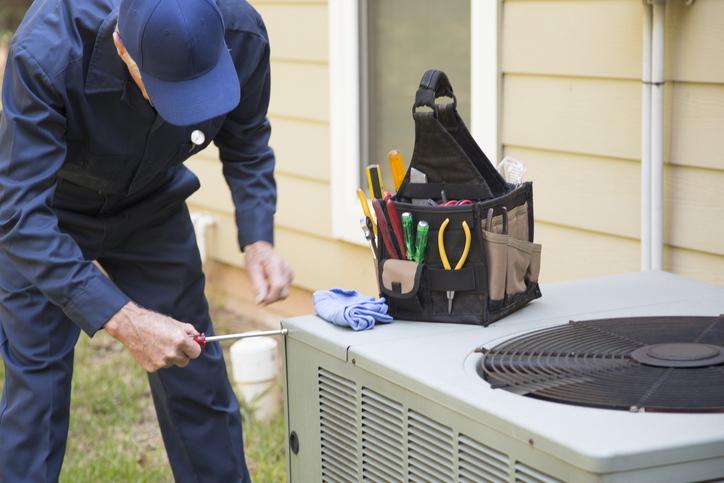AC CONDENSER VS COMPRESSOR: WHAT’S THE DIFFERENCE?

If you’re anything like most Americans, you don’t spend a lot of time thinking about how your air conditioner works—you care about whether your system can keep you cool and comfortable.
We don’t mind. You can leave the thinking to us. At A.J. Perri of Tinton Falls, NJ, we make it our business to understand how an air conditioner works so you can stay cool during the hottest summer months.
But it can be helpful to have a general idea of the mechanics involved, basic concepts like AC condensers vs compressors, how much it costs to replace each, and how to know whether your condenser or compressor goes bad.
Here's a quick primer on what's going on behind the scenes.
AC UNITS: THE BASICS
Air conditioners work by pumping cool air into your house, right? Not really. Your AC unit keeps things cool by removing heat from the air and recirculating it in all its cool goodness. A refrigerant like Freon accomplishes this refreshing miracle.
Your AC system comprises an evaporator, a condenser, and a compressor.
PART ONE: WHAT IS AN EVAPORATOR?
AC cycles start with your thermostat. During the summer, you set your thermostat to an ideal temperature that (hopefully) your entire household agrees on. When the temperature indoors rises above that ideal temperature, your thermostat sends a signal saying it's time to get to work.
The AC unit pulls warm air through your home's return vents and sends it to the evaporator unit, which is filled with refrigerant. This refrigerant absorbs heat from your home's stuffy air and moves cooler air back into your home. The refrigerant leaves the evaporator in the form of low-pressure gas.
PART TWO: WHAT IS AN AC COMPRESSOR?
The compressor is the heart and soul of the system, connecting the evaporator inside your system to the condenser outside. The compressor is actually one component of the AC condenser unit.
To release the accumulated heat, the compressor transforms the refrigerant into a higher-temperature, higher-pressure gas. It accomplishes this by packing the refrigerant molecules tightly, raising their temperature and pressure.
PART THREE: WHAT IS AN AC CONDENSER?
The heated refrigerant moves onto the condenser unit outdoors. The refrigerant now leaves the condenser and moves onto the expansion valve. Here, it is depressurized and cooled into a low-pressure liquid.
PART FOUR: BACK TO THE EVAPORATOR
This liquid moves back to the evaporator, ready to continue the cycle until your home reaches the desired temperature.
These four steps are repeated again and again, as long as your AC system is active.
WHAT’S THE DIFFERENCE BETWEEN AN AC CONDENSER AND COMPRESSOR?
The external portion of the air conditioner is called the condenser unit. That unit consists of multiple parts:
- Condenser coil
- Fan
- Compressor
- Cabinet
The AC compressor is part of the entire condenser unit, but there’s also a separate component called the condenser coil. These two elements serve different purposes. The compressor spreads gas throughout the system and the condenser coil transforms the refrigerant from a gas into a liquid.
The fan blows across the condenser coil to cool the refrigerant and help it return to a liquid. The cabinet is the exterior casing that protects the entire unit and all its parts.
All these components are crucial for keeping the cool air coming.
CHOOSE A.J. PERRI FOR YOUR AIR CONDITIONER NEEDS
Your home's AC unit is an intricate piece of equipment that may be hard to understand in layman's terms. Fortunately, A.J. Perri's HVAC technicians understand how AC works and can keep it running during the warm, New Jersey summers.
Call A.J. Perri to schedule your service appointment or call us at (732) 733-2541. We're here to make sense of your system and keep you comfortable at any temperature.
We specialize in:
- Air conditioner repair
- Regular AC maintenance
- AC services
- Heating services
- Plumbing services
- Air quality services
AC FREQUENTLY ASKED QUESTIONS
HOW DO I KNOW IF MY COMPRESSOR OR CONDENSER IS BAD?
The symptoms of a bad AC compressor or condenser have a lot of overlap, so there’s a good chance you’ll need to reach out to HVAC professionals for a clear diagnosis. For example, you might see the following if either part fails:
- You hear loud, strange noises from your AC unit.
- Your AC struggles to lower the temperature as well as it used to.
- You notice a leak around the unit.
The compressor might result in some other symptoms, including excessive vibrations, tripping the circuit breaker, or if the unit doesn’t turn on at all.
CAN A BAD CONDENSER RUIN A COMPRESSOR?
Yes. If the condenser isn’t working properly, it can cause the compressor to overheat and damage that component as well. A dirty or clogged condenser can sabotage your entire AC system in this way, so keeping it clean and clear should be a priority.
HOW MUCH DOES IT COST TO REPLACE A CONDENSER OR COMPRESSOR?
The total cost of either component varies depending on the specifications you need for your home and the labor prices, which fluctuate depending on your location. You’ll need to schedule an appointment and get a quote.
That being said, this should give you a general idea.
- AC Condenser Coil: The coil itself can cost several thousand dollars to replace.
- AC Compressor: Compressor costs are generally less than a coil, but can still cost several thousand dollars.
It can be more cost-effective to replace the entire unit than to simply get a new condenser coil, if that’s the issue. However, if your HVAC technician recommends replacing your whole unit, it’s best to take the advice of the pros.
Your AC specialist can help you figure out the solution that works best for you.
